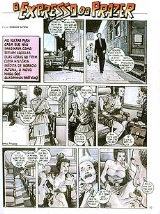
Horacio Altuna
Encyclopedia
Horacio Altuna is an Argentine
comics artist
.
, Altuna made his debut in the comics world in 1965 for publisher Editorial Columbia. His first characters were Titan, a Superman
-like superhero, Kabul de Bengala (1971, written by Héctor Germán Oesterheld
and Armando Fernández
among others), Big Norman, Hilario Corvalán and others.
From 1973 to 1976 Altuna collaborated with Fleetway
, Ediciones Record, Charlton Comics
, Playboy
and the French Les Humanoïdes Associés
.
In July 1975, in the daily newspaper El Clarín, Altuna with writer Carlos Trillo created the journalist character Hugo Chávez, best known as El loco Chavez, one of the Argentine most popular comics strips. Also with Trillo Altuna has drawn the series Charlie Moon and Las puertitas del señor López.
In 1982 Altuna moved to Sitges
, Spain, drawing stories for the Editorial Toutain and short erotic stories for Playboy. As of February 2005, he has published the comic strip
Familia Tipo in the newspaper El Periódico.
Argentina
Argentina , officially the Argentine Republic , is the second largest country in South America by land area, after Brazil. It is constituted as a federation of 23 provinces and an autonomous city, Buenos Aires...
comics artist
Comics artist
A comics artist is an artist working within the comics medium on comic strips, comic books or graphic novels. The term may refer to any number of artists who contribute to produce a work in the comics form, from those who oversee all aspects of the work to those who contribute only a part.-Comic...
.
Biography
Born in CórdobaCórdoba, Argentina
Córdoba is a city located near the geographical center of Argentina, in the foothills of the Sierras Chicas on the Suquía River, about northwest of Buenos Aires. It is the capital of Córdoba Province. Córdoba is the second-largest city in Argentina after the federal capital Buenos Aires, with...
, Altuna made his debut in the comics world in 1965 for publisher Editorial Columbia. His first characters were Titan, a Superman
Superman
Superman is a fictional comic book superhero appearing in publications by DC Comics, widely considered to be an American cultural icon. Created by American writer Jerry Siegel and Canadian-born American artist Joe Shuster in 1932 while both were living in Cleveland, Ohio, and sold to Detective...
-like superhero, Kabul de Bengala (1971, written by Héctor Germán Oesterheld
Héctor Germán Oesterheld
Héctor Germán Oesterheld , also known as his common abbreviation HGO, was an Argentine journalist and writer of graphic novels and comics who has come to be celebrated as a master in his field....
and Armando Fernández
Armando Fernández
Armando Fernández García is a Mexican former sport wrestler from Xalapa, Veracruz, in eastern Mexico. Nicknamed "La Jarocha" he competed in Olympic wrestling in the 1990s appearing in Wrestling at the 1992 Summer Olympics - Men's Greco-Roman 57 kg and Wrestling at the 1996 Summer Olympics - Men's...
among others), Big Norman, Hilario Corvalán and others.
From 1973 to 1976 Altuna collaborated with Fleetway
Fleetway
Fleetway, also known as Fleetway Publications and Fleetway Editions, was a UK publishing company which mainly produced comic magazines. For a time owned by IPC Media, they are now a division of Egmont Publishing....
, Ediciones Record, Charlton Comics
Charlton Comics
Charlton Comics was an American comic book publishing company that existed from 1946 to 1985, having begun under a different name in 1944. It was based in Derby, Connecticut...
, Playboy
Playboy
Playboy is an American men's magazine that features photographs of nude women as well as journalism and fiction. It was founded in Chicago in 1953 by Hugh Hefner and his associates, and funded in part by a $1,000 loan from Hefner's mother. The magazine has grown into Playboy Enterprises, Inc., with...
and the French Les Humanoïdes Associés
Les Humanoïdes Associés
Les Humanoïdes Associés is a French publishing house specialising in comics and graphic novels. Founded in December 1974 by Mœbius, Jean-Pierre Dionnet, Philippe Druillet and Bernard Farkas in order to publish Métal Hurlant, it quickly expanded to include a variety of science fiction work...
.
In July 1975, in the daily newspaper El Clarín, Altuna with writer Carlos Trillo created the journalist character Hugo Chávez, best known as El loco Chavez, one of the Argentine most popular comics strips. Also with Trillo Altuna has drawn the series Charlie Moon and Las puertitas del señor López.
In 1982 Altuna moved to Sitges
Sitges
*Church of Sant Bartolomeu i Santa Tecla . It houses two Gothic sepulchres , belonging to the an older church located on the same site...
, Spain, drawing stories for the Editorial Toutain and short erotic stories for Playboy. As of February 2005, he has published the comic strip
Comic strip
A comic strip is a sequence of drawings arranged in interrelated panels to display brief humor or form a narrative, often serialized, with text in balloons and captions....
Familia Tipo in the newspaper El Periódico.
External links
- Horacio Altuna biography on Lambiek Comiclopedia
- Gallery of Altuna's Erotic Comic Strips

